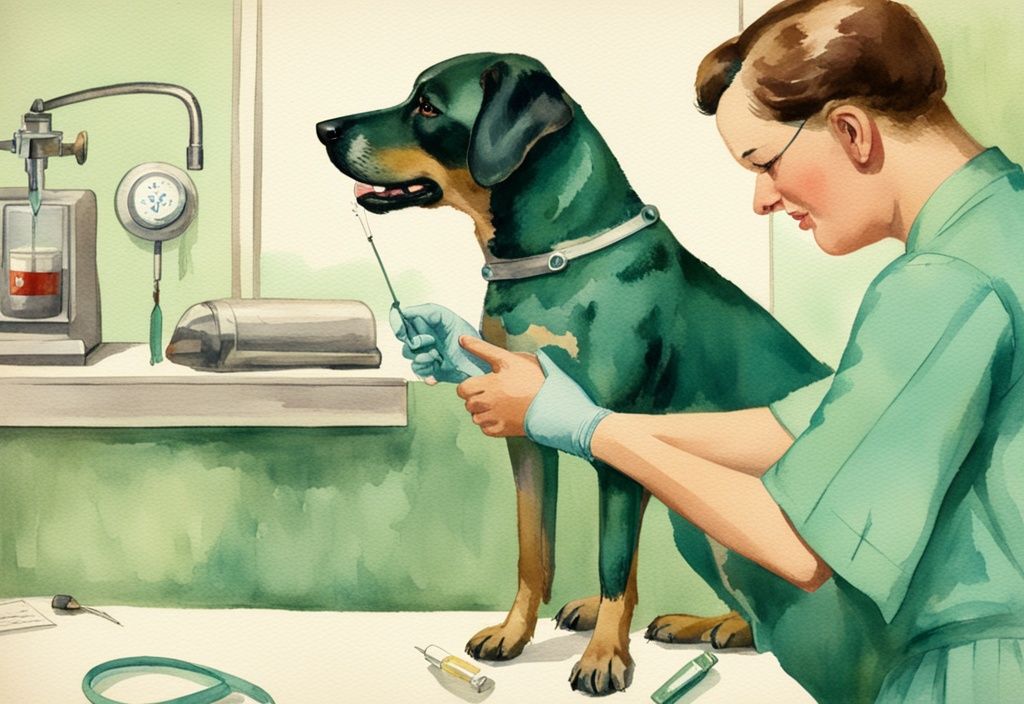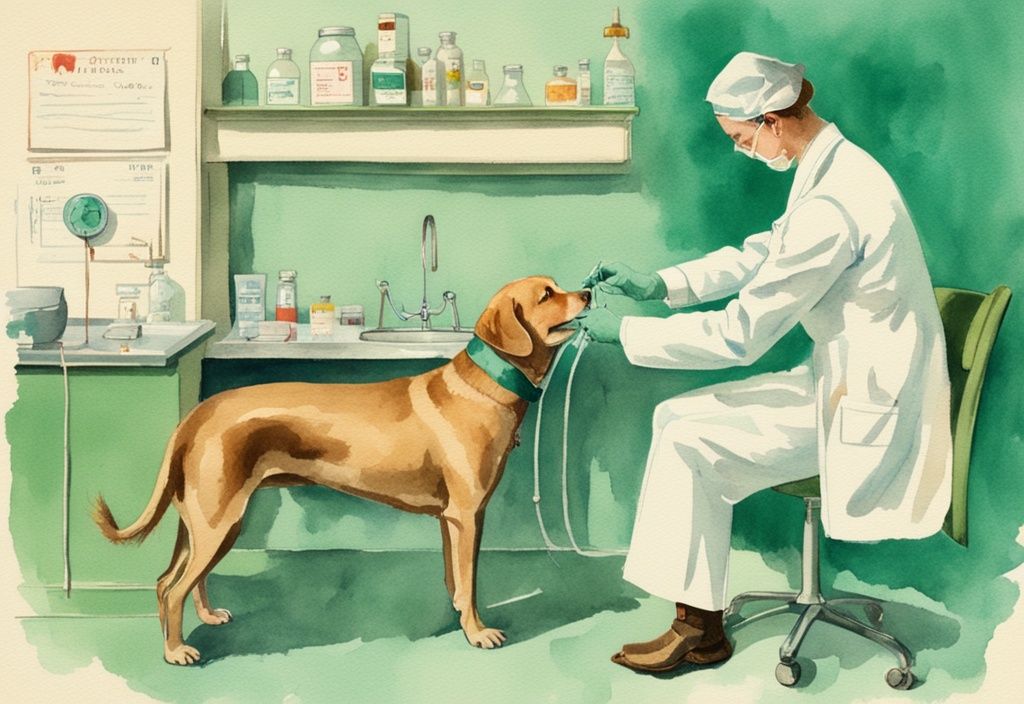Is Cytopoint for your beloved canine as safe as they say? As a fellow dog parent, I understand the concern—the itch, the discomfort your little furball endures. It tugs at your heartstrings. But hang on, let’s dissect this together!
This piece dives headfirst into Cytopoint’s safety and effectiveness, potential risks, and benchmarking it against other treatments. The aim? To help you, dear readers, make an informed decision for your four-legged family member.
Are you ready to explore, uncloak this compelling mystery and truly understand if Cytopoint is the right choice for your paw-fect companion? Let’s dig in!
The Essentials of Cytopoint for Dogs
Cytopoint has emerged as an effective and safe treatment option for dogs struggling with allergic itch and atopic dermatitis, as detailed in this comprehensive overview of biological treatments and their applications in veterinary medicine here. This revolutionary treatment stands out because it doesn’t include steroids, steering clear of the long-term side effects often associated with them. Instead, Cytopoint is a synthetic monoclonal antibody, distinct from immunosuppressants and conventional pharmaceuticals, and it’s specially developed and approved just for dogs.
Let’s dive into why this matters. The primary component in Cytopoint is Lokivetmab, which targets and neutralizes Interleukin 31 (IL 31). This cytokine is a notorious player in the itching process tied to the immune system. Impressively, Cytopoint has been prescribed to over 8 million dogs, a testament to its popularity and effectiveness among vets and pet owners alike.
How Does Cytopoint for Dogs Work?
The magic of Cytopoint lies in its targeted approach. It homes in on Interleukin 31 (IL 31) and puts a stop to its itch-inducing antics. When IL 31 is blocked, the relentless cycle of scratching, licking, and chewing is significantly reduced. This rapid relief allows those red, irritated patches of skin to finally start healing.
Many dogs show improvement within a single day of receiving their injection. It’s truly heartwarming to see them get relief so quickly. Within a week, most dogs experience significant improvements, and the effects can last anywhere from 4 to 8 weeks, depending on the individual dog’s response.
This means fewer vet visits, less discomfort for your furry friend, and more good days filled with play and snuggles. Not to mention, it brings peace of mind when considering if Cytopoint for dogs is safe and effective—because, after all, our pups deserve the best care possible.
Assessing the Safety of Cytopoint for Dogs
Cytopoint is a widely discussed treatment for allergic responses in our furry friends. This section dives into the manufacturer’s claims and independent studies related to its safety and effectiveness for dogs.
Analyzing Manufacturer’s Claims and Available Research
Research backed by the manufacturer boasts an impressive success rate of 80-98% in alleviating allergic responses in dogs treated with Cytopoint. Studies supporting these claims have demonstrated its efficacy and safety across various breeds and sizes. Clinical trials consistently depict Cytopoint as a safe option with minimal side effects. Interestingly, the adverse health events observed in dogs treated with Cytopoint were similar to those seen in the placebo group. In one key study involving 245 dogs, a control group of 63 dogs received a placebo, reinforcing the treatment’s reliability and safety profile.
Independent Studies on the Safety of Cytopoint
Independent research on Cytopoint’s safety and potential side effects remains relatively limited. Despite this, some veterinarians and researchers have voiced concerns, particularly about potential immune system interactions and the risk of triggering autoimmune diseases.

However, existing long-term safety studies over a one-year period of monthly injections have reported no significant side effects, offering some reassurance about the chronic use of Cytopoint. While these findings are promising, continued vigilance and further independent studies are essential to fully ensure that Cytopoint for dogs is safe in the long run.
Overall, Cytopoint shows great promise in treating dog allergies, but like any medical treatment, it’s important to stay informed and consult with your vet to make the best decisions for your pet’s health.
Uncovering Potential Risks and Side Effects of Cytopoint
Cytopoint has been a game-changer for many dogs suffering from chronic itchiness, but it’s crucial to weigh its benefits against the potential risks. Through this section, we’ll delve into the common side effects, severe and rare complications, and the long-term implications of using Cytopoint in our beloved furry friends.
Identifying Common Side Effects
Cytopoint is generally safe for most dogs, but just like any medication, it’s not without its side effects. Some dogs may experience mild gastrointestinal symptoms such as vomiting, diarrhea, loss of appetite, and decreased energy levels.
Beyond these, there are reported adverse reactions like otitis externa, dermatitis, bacterial skin infections, erythema, vomiting, anorexia, pruritus, diarrhea, and alopecia. After administration, dogs might also show mild tenderness at the injection site or even occasional limping.
Discussing Severe and Rare Side Effects
Though rare, severe side effects can occur, so it’s important to stay vigilant. Examples include hypersensitivity or allergic reactions like anaphylaxis. Symptoms could show up as grogginess, weakness, collapse, breathing difficulties, vomiting, facial swelling, or hives.
In very rare instances, severe gastrointestinal issues, epilepsy, and even death have been reported. Monitoring your dog closely after each treatment can help catch any adverse reactions swiftly.
Evaluating Long-term Risks of Using Cytopoint
Immune System Interactions
One primary concern with long-term Cytopoint use relates to its impact on the immune system. By blocking IL 31, Cytopoint could make dogs more susceptible to infections and potentially disrupt various physiological processes. Over time, this might lead to immune system dysregulation, presenting additional health risks.
The Link to Autoimmune Diseases
Another risk to consider is the potential for developing autoimmune diseases. Cytopoint’s interference with normal immune functions might trigger conditions like immune-mediated hemolytic anemia (IMHA) or neuro-fascial pain. Even though these cases are quite rare, it’s crucial for dog owners to be informed and vigilant.
Impact on Canine Health
There’s limited observational data on the safety of Cytopoint in dogs with serious pre-existing conditions, so caution is warranted. Additionally, Cytopoint’s safety hasn’t been thoroughly established for pregnant or lactating dogs. It’s best to engage in careful consideration and consult with your vet before using Cytopoint in these groups.
Comparing Cytopoint to other Dog Allergy Treatments
Cytopoint and Steroid Treatments: A Comparison
Cytopoint and steroids have their own special roles when it comes to managing allergies in dogs, each with its unique benefits and potential drawbacks. Cytopoint is a monoclonal antibody that goes after and neutralizes IL 31, a cytokine involved in the itch response. Unlike steroids, which can bring a slew of long-term side effects like increased infection risk, liver dysfunction, and Cushing’s syndrome, Cytopoint is designed to sidestep these issues. But hey, let’s not forget – it’s still a relatively new treatment, and the full extent of its impact on the immune system is something researchers are still figuring out.

Now, steroids have been the gold standard for managing allergic reactions in dogs for quite some time. Their strong anti-inflammatory and immunosuppressive properties can offer quick relief. However, using steroids over the long haul can lead to some pretty serious health problems for our furry friends. We’re talking weight gain, muscle wasting, kidney damage, and a higher likelihood of infections. So, while they’re effective, they might not be the best choice for chronic, long-term allergy management.
Discussing Cytopoint vs. Apoquel
Let’s dive into how Cytopoint stacks up against Apoquel. Cytopoint is a biologic therapy that zeroes in on the itch-inducing IL 31 cytokine. This means it can relieve itching without suppressing the entire immune system. One shot can provide weeks of relief, which is pretty impressive. And the side effects reported in trials have been minimal. However, as with any new treatment, there’s still a lot to learn about its long-term impact on the immune system.
Apoquel, in contrast, is an oral medication that works by inhibiting Janus kinases (JAKs), key players in the inflammatory responses to allergens. It’s known for being effective and quick to act, but there’s a catch. Apoquel can interfere with allergy testing, making accurate diagnosis a bit trickier. Plus, since it broadly suppresses immune activity, there’s a risk of increased infections and other immune-related issues if used over a longer period.
Both Cytopoint and Apoquel offer significant benefits by keeping those pesky steroids at bay, each with its individual risks and considerations. The best way forward? Always consult with your veterinarian to tailor the treatment plan to your dog’s specific health needs and medical history. After all, every dog is unique and deserves the best care tailored just for them.
Expert Insights: Vets Weigh In on Cytopoint
Your Vet’s Role: Pre-Treatment Assessments
Before starting Cytopoint, it’s crucial for the veterinarian to closely examine your dog’s medical history. This step helps pinpoint any predispositions or health issues that might influence the safety of the treatment. Special care should be taken to check for liver and kidney conditions, as these organs are vital for metabolizing and excreting medications. By fully understanding your dog’s overall health, vets can administer Cytopoint in a way that minimizes risks and maximizes benefits. Moreover, a thorough health check-up can help rule out other potential causes of your dog’s symptoms, ensuring that Cytopoint is indeed the right treatment choice.
How to Safely Mix Cytopoint with Other Medications
When considering combining Cytopoint with other treatments, the good news is that Cytopoint has been safely used alongside a variety of other medications, including parasiticides, antibiotics, antifungals, corticosteroids, vaccines, immunotherapy, antihistamines, and other antipruritics. Since each dog’s medication regimen is unique, consulting with your vet is essential. The veterinarian will carefully assess all the medications your dog is on to avoid any adverse interactions, ensuring the combined treatment plan is both safe and effective.
Importance of Post-Injection Monitoring and Follow-ups
Keeping a close eye on your pup after a Cytopoint injection is key. Post-injection monitoring helps evaluate your dog’s response and determine how often future injections should be, which typically ranges from 4 to 8 weeks. Regular follow-up appointments enable vets to track progress and quickly spot any potential side effects. If any adverse reactions pop up, immediate veterinary assistance is crucial for your dog’s safety and well-being. This continuity of care helps tailor the treatment plan to meet your dog’s specific needs, ensuring that Cytopoint therapy remains as effective and safe as possible throughout the course.
A Dog Owner’s Guide to Managing Cytopoint Treatment
Managing your dog’s Cytopoint treatment involves various aspects to ensure their safety and well-being. From budgeting for recurring costs to understanding proper administration and storage, there’s a lot to bear in mind. Let’s explore these essential elements to make Cytopoint treatment as smooth and effective as possible.
Budgeting for Cytopoint: Cost and Frequency of Injections
When it comes to managing the cost and frequency of Cytopoint injections, planning ahead is key. Each Cytopoint injection typically ranges between $50 to $150. Since most dogs need injections every 4 to 8 weeks, it’s crucial to incorporate this regular expense into your financial plans. By doing this, you ensure that your furry friend receives continuous treatment without any interruptions, which can vastly improve their overall comfort and happiness by reducing itchiness and discomfort.
Mastering the Process of Cytopoint Administration
Administering Cytopoint is something that should always be handled by a professional veterinarian. This isn’t like giving your dog an oral medication at home. Cytopoint injections require precise techniques to ensure both effectiveness and safety. Regular vet visits for these injections don’t just guarantee the correct dosage but also offer professional monitoring. This way, any potential risks or adverse reactions can be swiftly addressed, ensuring that the question “is Cytopoint for dogs safe” is consistently managed with the utmost care.
Cytopoint Storage and Handling Tips
Proper storage and handling of Cytopoint are essential for maintaining its efficacy and safety. Always store the medication in a refrigerator at the temperature specified on the packaging. Keeping the medication out of reach of children and pets is vital to avoid any accidental exposure or ingestion, which could have serious health consequences. For more information on responsible pet care, you might find it interesting to learn about what it means to curb your dog. By ensuring Cytopoint is properly stored, not only do you maximize its effectiveness, but you also gain peace of mind regarding its safety and suitability for your beloved pet.
So, while managing Cytopoint treatment might seem a bit daunting at first, with a little planning and professional support, you can ensure your dog’s comfort and happiness. The routine injections and mindful storage practices are small steps that lead to a big difference in your dog’s quality of life.

Closing Thoughts on the Safety of Cytopoint for Dogs
Cytopoint, designed specifically for canine allergic itch and atopic dermatitis, has shown itself to be incredibly effective and safe through thorough research and clinical trials. This treatment can profoundly improve the lives of dogs suffering from chronic itching, tackling the underlying cause and promoting skin healing. It’s crucial, however, that dog owners are well-informed about potential risks and side effects before deciding on this treatment.
One of Cytopoint’s standout features is its targeted approach. By using a monoclonal antibody (Lokivetmab) to neutralize the Interleukin 31 (IL 31) cytokine, it avoids the long-term side effects often linked with steroid treatments. The speed of Cytopoint’s effectiveness—usually noticeable within a day, and typically within a week—is particularly noteworthy for providing quick relief to our furry friends.
Still, caution and vigilance are essential. While manufacturer-backed studies report high success rates with minimal side effects, independent research insists on the importance of monitoring for adverse reactions. Common, generally mild side effects include gastrointestinal issues like vomiting and diarrhea. In rare cases, severe reactions such as hypersensitivity should be treated as emergencies, demanding immediate veterinary care.
Considering long-term use, there are concerns about immune system interactions and the potential for developing autoimmune diseases. Thus, comprehensive pre-treatment assessments by your veterinarian, focusing on your dog’s overall health including liver and kidney function, are crucial.
Additionally, the safety of Cytopoint for pregnant or lactating dogs remains undetermined, necessitating extra caution. As such, engaging in detailed discussions with your veterinarian, weighing potential risks and establishing ongoing monitoring needs, is highly recommended.
In conclusion, while Cytopoint promises an effective solution for managing allergic itch in dogs, its safety requires continuous evaluation tailored to each individual dog. Regular veterinary consultations and close observation are key to maximizing the benefits of Cytopoint and minimizing any potential risks.
Frequently Asked Questions
Unpacking the Main Function of Cytopoint?
Cytopoint primarily functions to neutralize Interleukin 31 (IL 31), a cytokine responsible for itchiness in allergic conditions. By blocking IL 31, Cytopoint helps reduce itching, allowing the dog’s skin to heal more effectively and improving overall comfort.
Is Cytopoint for Dogs Safe to Use?
Absolutely, Cytopoint is generally considered safe for most dogs when administered correctly by a vet. In my experience, I’ve found it to be a fantastic relief for dogs suffering from relentless itching without the usual side effects you’d worry about with other medications. However, it’s always wise to consult with your vet to ensure it’s the right fit for your furry friend.
Are There Natural Alternatives to Cytopoint for Dogs?
Yes, natural alternatives may be available, but it’s essential to consult with a veterinarian before starting or switching to them. Your vet can recommend safer, effective natural options tailored to your dog’s specific condition and needs.
What to Expect: Improvement Timeline after Cytopoint Injection
Many dogs show improvement within 1 day of receiving a Cytopoint injection. Significant relief from itchiness is commonly observed within a week, allowing the skin to begin healing and reducing discomfort quickly.
Can Cytopoint Be Combined Safely with Other Allergy Medications?
Cytopoint can be safely combined with other allergy medications under the guidance of a veterinarian. It is often used alongside various treatments, including parasiticides, antibiotics, antifungals, and antihistamines, to manage comprehensive allergy care.
Emergency Procedures: What to Do in Case of Severe Side Effects?
In case of severe side effects or an overdose, seek immediate veterinary assistance. Monitor for signs of hypersensitivity or anaphylaxis, such as trouble breathing, vomiting, or facial swelling, and act swiftly to ensure your dog’s safety.
